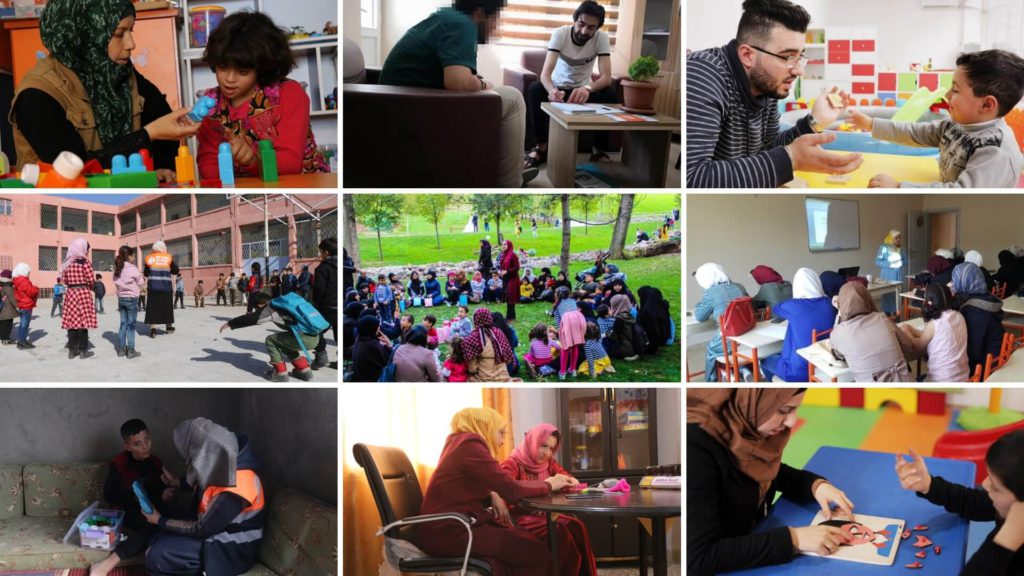
After over thirteen years, the severity and complexity of humanitarian needs remains extensive. Years of continued bombardment, attacks on civilians, doctors, health workers, and healthcare facilities has left an extremely vulnerable population in Syria. The healthcare infrastructure has been decimated leaving people with limited to no access to emergency and specialized medical care as they are struggling with disease and malnutrition among other illnesses. Less visible, countless Syrians, whether they remained inside Syria or sought refuge in Turkey, Jordan, or Lebanon, are in need of mental health care after being exposed to the traumatic experiences they have faced for the past 13 years
The United Nations High Commissioner for Refugees (UNHCR) notes that “the most prevalent and most significant clinical problems among Syrians are emotional disorders, such as: depression, prolonged grief disorder, posttraumatic stress disorder and various forms of anxiety disorders.”
The demand of Mental Health and Psychosocial Support (MHPSS) services in the area will continue for a long period of time according to field assessments done by UN agencies (WHO – UNICEF- UNFPA - & UNHCR) as the consequences of the war will remain especially for the new generation. “No Lost Generation” UNICEF 2018 Annual Report.
MHPSS is a vital ongoing adaptation process that needs to be conducted with high standards of care according to WHO and Inter-Agency Standing Committee (IASC).
With over thirteen years of crisis, a generation has come of age in a war zone. Nonetheless, in a crisis zone, the need for triage is constant. Therefore, most organizations and institutions responding to the Syrian crisis, especially in the earlier stages, prioritize the provision of lifesaving water, food, clothing, and urgent medical care over mental health care.
The UOSSM family has played an integral role in mental health, as a leader, expert, and innovator, in the Syrian crisis, and led the way by taking strategic mental health initiatives since 2013, to find constantly evolving solutions for growing mental health issues arising among the Syrian people due to the armed conflict. UOSSM:
Due to the lack of Syrian psychiatrists in Syria, a tele-referral service, Syria Tele-Mental Health (STMH) network, established through the Collegium Telemedical site of Yale University, was led in early 2014 by an expatriate Syrian Psychiatrist in UK, Dr. Redwan Elkhayat, who chaired the UOSSM MHPSS Committee, and Dr Wael Alraas, a Syrian Psychiatrist, who was UOSSM’s Director of the MHPSS Program at the time, to address the high demands and needs. This Tele-Psychiatry service continues to support the work of UOSSM’s only psychiatrist in Syria and provides the needed technical support. UOSSM strives to provide the highest quality health services, using intervention techniques designed for crisis settings.
The goal of the MHPSS and Protection program is to improve the psychosocial well-being and resilience of vulnerable people affected by the Syrian crisis, in addition to focusing on adaptation and cohesion of Syrian refugees in Turkey, to enhance social integration among the refugees and local communities.
While UOSSM offices in Turkey support programs in Turkey and Syria, UOSSM USA operates through its regional office in Jordan to provide direct essential services in Jordan and Gaza.
(1) UOSSM played a major role in establishing the Mental Health and Psychosocial Support (MHPSS) strategy within the Syrian context in WHO cluster in Turkey. UOSSM has both quantitative and qualitative (technical) capacity in terms of MHPSS and protection service providers with high standards of care according to WHO and Inter-Agency Standing Committee (IASC) standards. UOSSM has trained hundreds of Syrian service providers on MHPSS and protection services, who became experts in this field in the native language of the beneficiaries. In addition, UOSSM initiated an operating model and pathways to be able to provide MHPSS and protection services from a single facility to cover the multiple needs of beneficiaries, in coordination with the other service providers in the field. In addition, because of UOSSM’s expertise with wartime mental health, UOSSM participated in in the design of a specialized psychosocial support guide, in partnership with WHO, that is being deployed to all the social workers in Syria. The guide includes many skills, techniques, and programs that are necessary in approaching mental support.